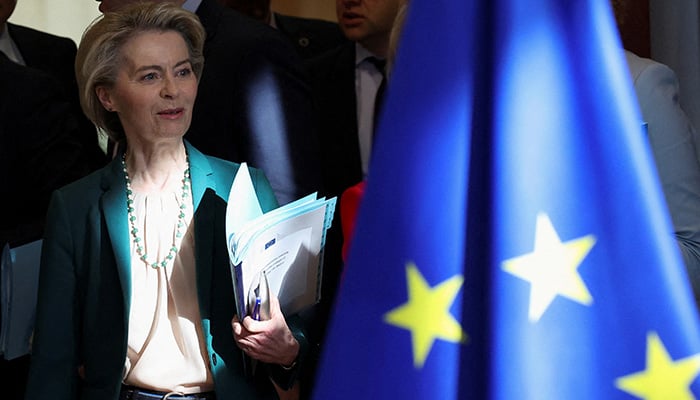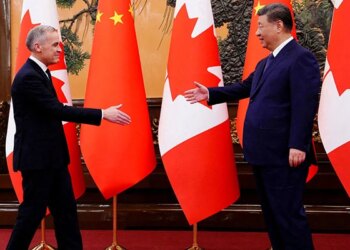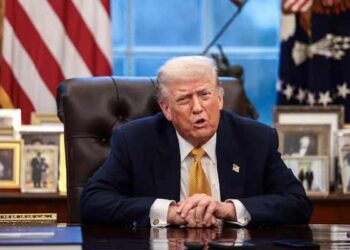Select Language:
- EU to suspend countermeasures for 90 days: von der Leyen.
- “Response measures will activate if talks are unproductive.”
- Global stock markets rebound after Trump halts tariffs.
The European Union will temporarily suspend its initial countermeasures against U.S. tariffs after President Donald Trump announced a temporary reduction of some tariffs imposed on multiple countries, European Commission President Ursula von der Leyen stated on Thursday.
The EU was set to introduce counter-tariffs on approximately 21 billion euros ($23.25 billion) of U.S. imports starting next Tuesday in response to Trump’s 25% tariffs on steel and aluminum. The EU is also considering its response to U.S. tariffs on cars and the ongoing 10% tariffs.
“We wish to allow room for negotiations,” von der Leyen explained on platform X. “While we finalize the EU countermeasures, which received strong backing from our member states, we will pause them for 90 days.”
Trump’s abrupt decision on Wednesday to postpone most of his new tariffs provided relief to struggling global markets and anxious leaders worldwide, even as he escalated the trade conflict with China.
This policy reversal came less than a day after significant new tariffs were introduced and followed a period of intense financial market instability reminiscent of the early days of the COVID-19 pandemic.
U.S. stock indexes surged in response, and this optimism continued into Asian and European markets on Thursday.
Prior to Trump’s reversal, market upheaval had caused trillions of dollars in losses and resulted in a sharp increase in U.S. government bond yields, which seemed to draw the president’s attention.
Meanwhile, Trump intensified pressure on China, which is the world’s second-largest economy and a major source of U.S. imports, by raising tariffs on Chinese goods from 104% to 125%.
Additionally, he signed an executive order aimed at diminishing China’s influence over the global shipping industry and revitalizing U.S. shipbuilding.
Trade Conflict with China
China labeled Washington’s actions as threats and extortion.
Commerce Ministry spokesperson He Yongqian stated at a regular briefing that China would “follow through until the end” if the U.S. insists on its unilateral approach. However, the ministry emphasized that China remains open to dialogue based on mutual respect.
In response, Beijing may retaliate after announcing an 84% tariff on U.S. imports on Wednesday to counter Trump’s earlier tariff announcement.
Trump argues that the tariffs aim to correct trade imbalances with China and believes a trade resolution is still possible. However, officials have indicated that they will prioritize discussions with other countries such as Vietnam, Japan, South Korea, and others looking to negotiate agreements.
The value of China’s yuan fell to its lowest level against the dollar since the global financial crisis on Thursday.
EU Suspension
In Europe, yields on eurozone government bonds rose, spreading narrowed, and market expectations for European Central Bank rate cuts diminished following Trump’s announcement. Stock prices across Europe rallied.
Von der Leyen stated that Trump’s decision marked a significant step toward stabilizing the global economy before revealing the EU’s decision to suspend its own counter-tariffs.
However, she cautioned that these measures could be reinstated.
“If negotiations do not yield satisfactory results, our countermeasures will be activated. Preparatory work for further countermeasures is ongoing,” she commented, adding, “All options remain on the table.”
Trump’s reversal is not absolute; a 10% tariff on nearly all U.S. imports will still remain in effect, as per White House statements. This announcement does not appear to change the existing duties on autos, steel, and aluminum.
The U.S. tariff suspension also does not affect duties imposed on Canada and Mexico, as their goods are still subject to a 25% fentanyl-related tariff unless they comply with the rules of origin in the US-Mexico-Canada Agreement.
The EU had planned to impose additional tariffs on U.S. imports, including maize, wheat, motorcycles, poultry, fruit, and clothing, but those tariffs are now halted.
Other countries, like India, have expressed eagerness to quickly negotiate trade deals with the United States.
Uncertainty and Concerns
Meanwhile, oil prices dropped by 2% on Thursday as concerns regarding a deepening U.S.-China trade conflict and potential recession overshadowed the earlier relief caused by Trump’s announcement.
Some central bankers also expressed caution.
European Central Bank official Francois Villeroy de Galhau referred to the tariff pause as “less bad news” during an interview with France Inter Radio, highlighting that uncertainty continues to pose a threat to trust and economic growth.
Business leaders echoed the sentiment that not all issues have been resolved.
Nicolas Ozanam, head of the French wine and spirits industry group FEVS, commented on Trump’s pause as “half good news.”
He noted that the temporary break allows French wine and spirits exporters to resume shipments with reduced tariffs, leveling the playing field with other suppliers. However, the 90-day period presents logistical challenges, and the persisting 10% customs duties will still result in inflationary pressures.
This situation, he remarked, is likely to cause price hikes and subsequently a decline in U.S. consumption.






